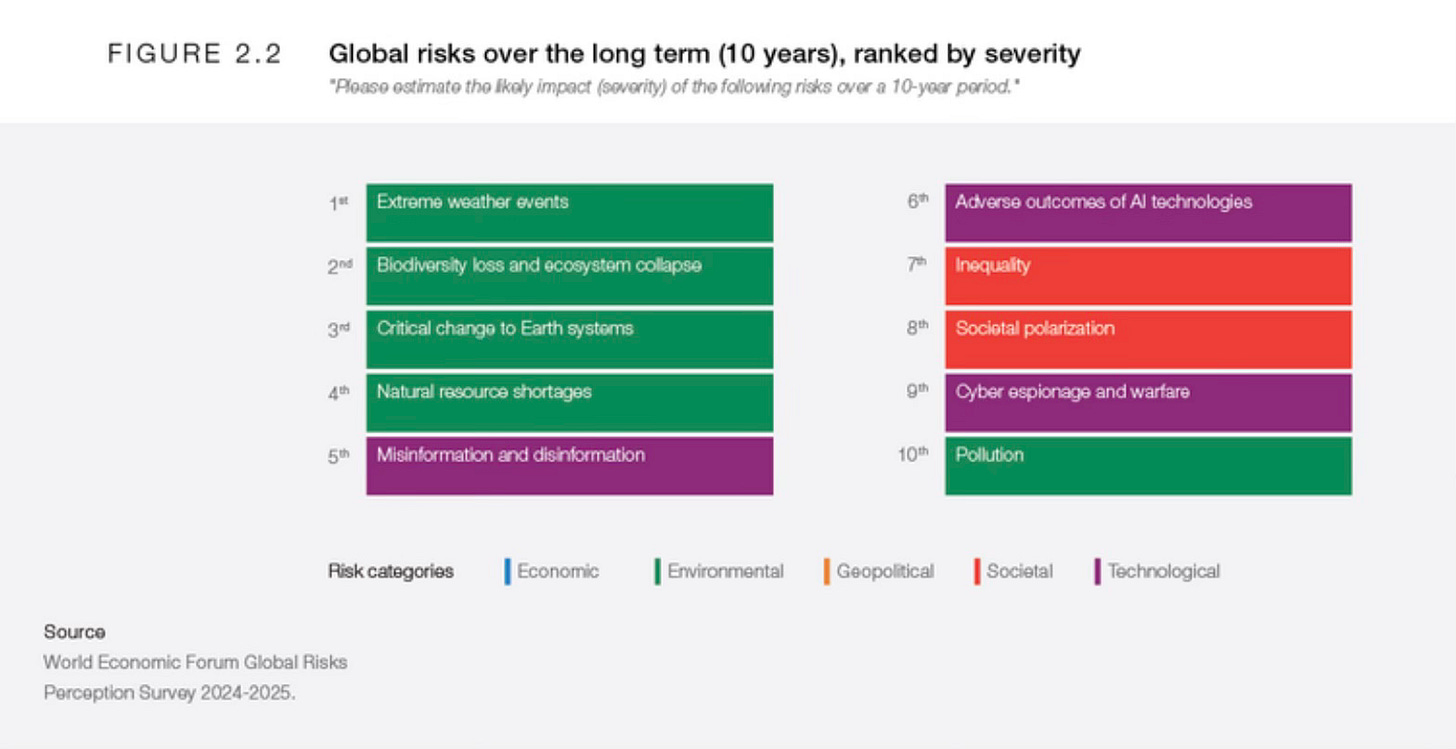[POST] Climate manslaughter
Sometime in the future, the charge will stick against both corporations and governments
This is a reader-supported publication. I give it all away for free but could really use your support if you want me to keep doing this.
Manslaughter is defined as the unlawful killing of a human being without malice or premeditation, often categorized as voluntary (intentional but without premeditation) or involuntary (unintentional due to negligence or recklessness).
When it comes to climate change, we can argue about intention, but there is a case to be made: first against the fossil fuel industry and subsequently against governments that willfully enable this generational harm through inaction (not addressing the issues) or action (tearing down existing government regulations addressing the issues).
The case is built in sequence, not unlike how it was against Big Tobacco: focusing on the elements of knowledge of harm, reckless conduct, and causation.
First, is there widespread knowledge of the danger?
Major energy companies have been aware for decades that the extraction, production, marketing, and burning of fossil fuels significantly raise atmospheric CO₂ levels, which are the primary driver of anthropogenic climate change.
There are smoking guns galore: Internal documents and scientific studies available to these companies have long forecasted a global catastrophe and detailed the lethal risks associated with continued fossil fuel usage.
Second, what did the fossil fuel companies do in response to this knowledge?
Instead of seeking mitigation, major firms pursued public relations efforts to obscure or deny the dangers, and actively resisted regulation of, or changes to, their business practices.
Third, can we link this knowing behavior to deaths?
The evidence piles up all around us of how climate change has directly contributed to fatal events such as heat waves, wildfires, and floods. Scientific studies of attribution (tracing the causality) show these supercharged events (by historical standards) were virtually impossible or extremely unlikely without human-induced greenhouse gas emissions.
Fourth, can we cite gross negligence?
By continuing conduct known to pose a grave risk to human life, especially in the face of clear scientific warnings, these companies (and the governments who regulate them) have acted and continue to act with reckless disregard for entirely foreseeable consequences.
That last bit satisfies the requirement for involuntary manslaughter in many legal jurisdictions across the West.
To sum up:
Energy companies know full well what they’re doing and what the consequences (externalities) will be.
They actively seek to conceal or downplay the associated lethal risks, and work openly against regulatory solutions.
These same companies (and ultimately the governments behind them) thereby cause, or substantially contribute to, climate-related deaths through their reckless or grossly negligent disregard for public safety.
This is the fundamental case made by legal scholars and advocacy groups, and, in my opinion, it tracks nicely with the successful liability suits against Big Tobacco.
Yes, all pretty much theory for now, but, remember, laws typically start with disasters and loss of life in circumstances that enrage the public. We are approaching that rage point.
The earliest warning is, of course, insurance companies jacking up homeowners rates — or just abandoning entire state markets — in response to waves of climate-driven claims over homes lost to fires, floods, tornadoes, and other extreme weather events. That dynamic is just beginning to ripple through our society.
Longer term, the trend lines are clear: weather climate is the perceived leading threat to business climate:
Note also that #2 and #3 and #4 are causally related, along with #10. In contrast, AI ranks 6th overall and wars rank 9th.
When the business world identifies its leading global stability risk, governments are supposed to act on such awareness and consensus, are they not?
The Climate Change Performance Index ranks the world’s major economies (67) on their efforts to combat, and adapt to, climate change. The US ranks 57th, ahead of only Japan (58), Argentina (59), Taiwan (60), Kazakhstan (61), Canada (62), South Korea (63), Russia (64), UAE (65), Saudi Arabia (66), and Iran (67).
What do most (8/11) of these countries have in common? They are home to major fossil fuel companies, both private and public. The rest are Asian countries extremely dependent on fossil fuel imports.
On Fresh Air a couple days back, the NPR program interviewed a noted environment journalist Brom Lustgarten, asking: “Are there any nations that are making encouraging or promising steps forward and tackling this issue of climate warming and keeping people safe?”
Lustgarten’s response is damning WRT to the USA:
I think you can answer that in a bunch of different ways, but if you slice it in all the ways, I'd say almost every other nation is making some forward strides in this direction.
And so you can look at how countries in Europe (Norway, France) are recruiting American scientists and American academics and supporting their research or pledging new funding for climate research or how their scientific institutions have really bolstered their own weather forecasting capabilities to exceed the capabilities that the United States had a year ago, and then certainly to carry the mantle as United States’ capabilities for weather forecasting wane. So those are really positive steps from a scientific perspective.
I think politically, there is generally more, you know, support for addressing climate change globally among, you know, the countries that participate in the Paris Accords or the annual COP meetings, then there is resistance at this point.
I mean, even Middle Eastern countries and the oil economies there are paying some form of lip service to the issue.
And then you can see leadership in different forms in places like China, which is ascending to be the global economic leader, is shifting rapidly the amount of energy that it produces from renewable energy and the technologies that support that and the lifestyle changes like electric vehicles, which are technologically advancing substantially, or even the deployment of nuclear technology and new nuclear reactors, really investing that money that we talked about being so important and seeing results from it and seeing rapid technological change and a rapid shift in an economy that's towards a greener economy that will have an important impact because the faster that global emissions are reduced, the slower and the less extreme and radical the actual climate change and the actual warming will be.
So all of those are really solid examples of leadership that we're seeing around the world.
Where is America is all of this? It is nowhere to be found, per Lustgarten, who described Trump’s ongoing moves as meaning that:
The United States is not participating in any aspect of global efforts to address climate change. It means that we're not going to be a negotiator or a player in making commitments to change the trajectory of that climate change, to lessen the severity of that climate change.
It means that we're not going to be a significant player in global efforts to decide how to fund and support countries around the world as they face their own disasters or mega disasters. And it means that we're not going to play much of a role at all in preparing ourselves or the world for the change that's going to come.
And so it's delegating that responsibility to other parts of the world, which will surely continue it. And it is relegating the United States to the role of a bystander and probably in the long term to a role of follower. And I think my reporting suggests a role of being somewhat economically disadvantaged.
So, here’s the emerging economic bottom line, per Lustgarten:
Climate change, in one way or another, is stacking up to be the most expensive and the most economically significant challenge that humanity has faced. It will cost the United States, according to the experts and economists that I speak with, upwards of 1% to 3% of its annual GDP per degree of Celsius of warming.
Humanity has reached the point on its ever-upward trajectory where it’s no longer a trade-off between the environment and the economy but rather a situation in which the environment determines the economy. This is the big outcome from America spreading its internal rule-sets on trade and integration to the wider world: we have set in motion the Anthropocene — or the geologic age in which humans drive the planet’s evolution more than the other way around.
We understand the causality. We understand the harm. And, we, in the United States and under this administration, are not only refusing to act but are actively trying to worsen the situation by discouraging the necessary responses and backtracking on those already begun.
That, to me, in grand strategic terms, is involuntary manslaughter on a global scale.
This judgment alone prevents Trump from ever winning a Nobel Peace Prize, in my opinion.
Why?
Because the unnecessary deaths triggered globally by this administration’s many willfully unscientific policies will be vast.
Trump doesn’t deserve to be on anybody’s Mount Rushmore, unless it’s got Hitler (11-17m dead), Stalin (13-20m dead), and Mao (40-65m dead) already up there. You wanna talk “American carnage”? That’s the sheer level of death this administration will deal on a long-term global basis through its:
Environmental policies (WEF: Climate Crisis May Cause 14.5 Million Deaths by 2050)
RFK Jr’s gonzo healthcare policies (JAMA: Historical Comparisons of Morbidity and Mortality for Vaccine-Preventable Diseases in the United States), and
Trump’s foreign aid cuts (LANCET: Trump global aid cuts risk 14 million deaths in five years, report says).
Plenty of journals have recently compared Trump’s withdrawing America from the international liberal trade order as a sort of “global-level BREXIT.” That decision alone will cost plenty in economic terms, to include an attributable rise in premature deaths both in the US and across the world.
Start with that reality BEFORE adding in the involuntary manslaughter charges regarding our nation’s new take on climate change, pandemics, and developmental assistance.
America was right to claim all the good it has done over the past eight decades — something I’ve routinely described as the single-greatest gift to world history by any one nation.
But, eventually, we’re going to have to own up to the death and destruction we’re currently setting in motion.
The only question for historians will be: Did all this damage negate all that good?
You know, there is this Russian and Chinese rationalization scheme when it comes to Stalin and Mao, or them being 70% good and 30% bad.
Right now, I would take that breakdown/bet in the hopes that it won’t be any worse.
Again, I suspect future generations will be apologizing to the world for this administration for decades — very much like Germany’s decades-long guilt trip over the Nazis and WWII.
That is one helluva legacy to leave one’s offspring. We should all be deeply ashamed.







